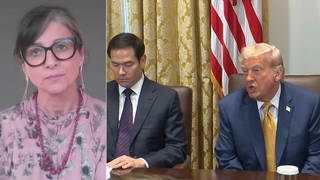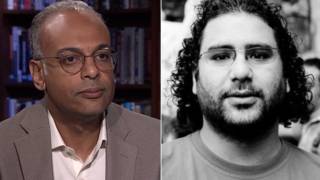
Topics
Guests
- Sharif Abdel KouddousDemocracy Now! senior producer
- Noha RadwanAssistant Professor of Arabic and Comparative Literature, University of California-Davis
Democracy Now!’s senior news producer Sharif Abdel Kouddous reports live just blocks from Tahrir Square in Cairo where supposed pro-Mubarak crowds are descending on the peaceful demonstrators. He interviews University of California-Davis Professor Nora Radwan about the current situation in Egypt. “The emotional response of the people on the street is that we did not come here to negotiate with him. We came here to ask him one thing, which is to step down,” Radwan said. “The Egyptians understand that there is no guarantee that Mubarak and his government can deliver any constitutional reform or any meaningful change in Egypt.” [includes rush transcript]
Transcript
AMY GOODMAN: Our senior producer, Sharif Abdel Kouddous, is in Cairo right now. Sharif, we’ve just gotten reports that Anderson Cooper, the CNN reporter, was punched 10 times by a pro-Mubarak mob. We were just speaking to you when you were in Tahrir Square before coming into the studio. It is a very different scene than you just brought to us in that remarkable piece that you just sent, Sharif.
SHARIF ABDEL KOUDDOUS: That’s right, Amy. Just below me here — we’re standing on Kornish Al Nile Street, and there are just huge crowds of pro-Mubarak crowds that are heading to Tahrir. More of them are coming. When we left Tahrir Square, there were clashes starting to happen, face-offs. The protesters, the pro-democracy protesters, had linked arms trying to hold back the crowd. There was a lot of pushing. There was a lot of cursing on the side of the pro-Mubarak forces. It remains to be seen what’s going to happen.
I’m also joined here in downtown Cairo by Noha Radwan. She’s a professor of comparative literature at University of California, Davis. She’s been here since Saturday, also Egyptian.
Noha, can you talk about what’s happening now with these pro-Mubarak forces here? What’s the precedent of this? And just put it all in context of this mass uprising here in Cairo.
NOHA RADWAN: Well, what we see are mobs of supposedly pro-Mubarak crowds, that are supporting him to stay for at least ’til the end of his term. I think that this is not unprecedented. We know that this has been happening for years. In fact, before even Mubarak was president, President Sadat hired mobs to receive President Nixon in ’74, to receive him after going to Israel in ’77 and after ’79. Mubarak has hired thugs and mobs to make sure that we never have a fair election or referenda in the past. So, Egyptians are very aware of this scene. It is not a surprise to them. I think the magnitude may be a surprise, but the act is not.
SHARIF ABDEL KOUDDOUS: And your assessment of President Mubarak’s speech last night? He came on, the second time he’s spoken to the country since this uprising began. What did he say, and your analysis?
NOHA RADWAN: I think the demonstrators understand that every time he comes on TV, it’s a small victory, because it shows that he’s actually retreating. What he offered first was to change the government. And then what we saw is not a change of government, actually a reshuffling of some old faces — so, one point against him, as far as his very little credibility is concerned.
And then, what he actually said yesterday, still the reaction was that we don’t want to negotiate with him. The emotional response of the people on the street is that we did not come here to negotiate with him. We came here to ask him one thing, which is to step down. If you think about this in a more rational way and if you think about the reasons why they do not want to negotiate with President Mubarak, I can tell you that he has absolutely no credibility. We do not believe that he’s going to do anything that he promises. He is now in a very weak position. And so, he’s making some promises. There’s absolutely no guarantee that if these people in Tahrir Square go home, that he is going to do any of the things that he is promising.
Egyptians have not missed the fact that he did not say, “I promise not to run for another term of presidency.” What he actually said is “I had no intention of running for another term of presidency.” But by the same token that makes him unable to step down right now, because Egypt is facing difficult times and an emergency situation, there is no reason why he cannot create a similar scene like this in November and say, “It is also a very difficult time for Egypt, and I would have loved to step down, but I absolutely can’t.” There’s also no reason why his son cannot run for the next term of presidency. We know that he may have left the country, but we also know that he can come back. He has never resigned his position in the National Democratic Party.
Mubarak never spoke of dissolving this parliament that we have, that has come through forged and completely farcical elections. So, if he promises constitutional reform, the question is, who is going to supervise this constitutional reform? If it’s this farcical parliament that we have, this charade of a parliament, then it’s going to be similarly a charade of constitutional reform. Even that, he could not do very well.
He spoke about reforming Article 77 and Article 76. We know that Article 77 is the one about the — I’m not sure which one is which, actually — 76 may be the one about terms of presidency, but we can always create an exception, because of exceptional times, like we have right now. And the other article is about the majority vote of the parliament. And even if he changes that, makes it maybe 25 percent instead of 75 percent, or whatever it is, how do we know that he’s not going to have his own people in the parliament to give him whatever number of votes that he needs for whoever he wants to become our next president? The Egyptians understand that there is no guarantee that Mubarak and his government can deliver any constitutional reform or any meaningful change in Egypt. They really are adamant they want him out.
AMY GOODMAN: Noha Radwan and Sharif, we are getting reports the Egyptian army is warning pro-Mubarak supporters from attacking peaceful protesters, or it will intervene decisively, they say. We also have reports on a CNN blog that a pro-Mubarak group arrived on camels and horseback, charging into the square. CNN also reported earlier, a reporter talking to some of these pro-Mubarak forces, who said they work for the state petroleum company. Their bosses told them to come out. What is your sense of who these people are, as we show images from Al Jazeera English of the protests in the streets now?
SHARIF ABDEL KOUDDOUS: Well, Amy, as I said before at the top of the show, there are reports that the oil minister, Sameh Fahmi, ordered all oil employees to stage a protest in Heliopolis, another district of Cairo. I actually have seen camels and horses right here on the street beneath us. So, as Professor Radwan said, you know, there is a precedent to this, to sending out these forces to try and quell this uprising. It remains to be seen what happens. Professor Radwan, you’re also holding these pamphlets in your hand. What is the significance of them?
NOHA RADWAN: Well, these pamphlets, I actually collected on the square this morning. And they are still adamant about — it says, “There is no alternative to bringing down Mubarak’s regime.” They’re calling for another peaceful Friday demonstration, this coming Friday, February 4th. And the third one is saying, “No negotiations with this regime.”
What I found most interesting about these pamphlets is not exactly what they say, because there is nothing new here, but what is interesting is who has signed these pamphlets. The first one that is calling for the peaceful Friday is signed by something called the Movement of the Youth for Liberation. The second one is the Socialist Bloc for Change. And the third one is called the Voice of Revolution, which I understand is done by the youth movement that we call the Facebookers in Egypt.
What is interesting is that this is really a diverse group of people who all want democratic constitutional reform. It is — the movement is not at all contained by any one party or any one group. People understand that we want a civil government and that we want everybody to be represented, and we want everybody’s voice to be heard. People are very tired of this dictatorship that we have. And I am afraid that if we do not give this movement a chance, that we are going to be putting the Egyptian people between the rock and a hard place, between the choice of dictatorship and theocracy. I have — I am not going to make predictions as to what they are going to choose, but I think this is more — this is better than both of the alternatives that would be left if this movement gets crushed.
AMY GOODMAN: The European Union has just called on Mubarak to act as quickly as possible to transfer power. And we also have reports from a Al Jazeera web producer in Tahrir Square: at least two camera crews are being chased by mobs yelling “Al Jazeera! Al Jazeera!” Neither of them are Al Jazeera, though they seem to be looking for Al Jazeera reporters. Reports are also, they’re saying, the web producer, at least one Al Arabiya correspondent being stabbed. Again, a lot rolls that we cannot confirm at this moment. Human Rights Watch confirming several reports of undercover police officers loyal to Mubarak looting and committing acts of violence.
SHARIF ABDEL KOUDDOUS: Amy, downstairs, when we were walking here from Tahrir Square, I was walking with Jacquie Soohen of Big Noise Films. She was filming, and one of the men here who is protesting asked us if we were Al Jazeera or if we were Al Arabiya. And he said, “If you are,” and he drew his finger across his throat like this. So there’s a lot of hatred out there. I’m very disturbed to hear of these attacks in Tahrir Square on journalists. And I hope this doesn’t escalate further. Noha?
NOHA RADWAN: Well, I also have friends who are still in Tahrir Square, and there are reports of people who have been hurt and injured right now by the pro-Mubarak mobs.
I also wanted to really mention that we are in fact — by “we,” I mean the people who have been camping out in Tahrir Square — we are counting on the support of the people abroad. We’re not too hopeful about the administration, but I get reports of big demonstrations in San Francisco, where I have left my daughter, and she has been telling me about all the demonstrations she goes to. And I have friends in New York who are telling me about the demonstrations that they have been in in New York. I’m counting on the support of a lot of friends and a lot of Egyptians abroad.
The Egyptians here have told me that they understand that the American administration has its interests in the region that it’s worried about it, and that it now is itself stuck between supporting the ideals of democracy that President Obama spoke about when came as president and in his inauguration speech — he said that dictators should know that they are on the wrong side of history. These are really fine ideals, but Egyptians understand that speeches are one thing and interests in the region are a different story. And they understand the dilemma is that there is a conflict between interests and ideals. And the message, I think, that they want to get out is that Egyptians are willing to negotiate. They’re not willing to capitulate, like Mubarak has done in the past, but they are not going to refuse to negotiate with foreign governments and talk about what is best for them and for the region at the same time. We really do want to negotiate, but we really cannot accept another capitulation.
SHARIF ABDEL KOUDDOUS: And Amy, ever since this uprising began, I really think that Egypt has been reborn, and the fear of this thuggery and fear of the state security forces, fear of the police, has evaporated. And once that fear barrier has been broken, it can’t go back. And I think the people are standing strong in Tahrir. When I left them, they had linked arms, and they were facing down, and they said that they would stay there regardless of what happens.
AMY GOODMAN: I want to —
NOHA RADWAN: Can I second that? I would really like to second that. I’m very grateful to have had the opportunity to be part of this. And I do believe that the people are going to stay until the end. I am going to finish this recording now and go back to Tahrir Square, and we’ll see what happens. What the people swore this morning is that we’re not leaving ’til he leaves.
AMY GOODMAN: I want to thank you both very much for being there. Noha Radwan is assistant professor of comparative literature at University of California, Davis. She has been partaking in the protests for the last number of days in Cairo, an Egyptian American. And Sharif Abdel Kouddous, our senior producer, here in New York usually, in Egypt right now covering this historic uprising that has taken place. Sharif, Noha, please be very, very careful right now. When we come back, we’re going to go to Noam Chomsky. Please take care. And thank you for your excellent reporting. This is Democracy Now!, democracynow.org, The War and Peace Report. Thank you also to Hany Massoud, Anjali Kamat, also there. We’ll be back in a minute with Professor Chomsky.












Media Options